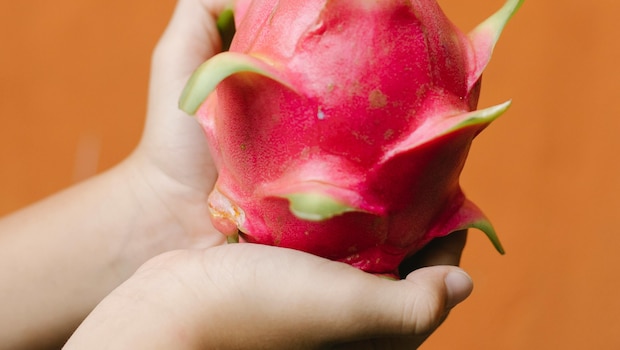Dragon fruit, also known as pitaya, has gained popularity as a superfruit due to its striking colour, unique taste, and rich nutritional profile. Packed with antioxidants, vitamin C, fibre, magnesium, and other essential minerals, it is often included in smoothies, salads, or eaten on its own. Many health enthusiasts choose dragon fruit for its potential to support digestion, immunity, skin health, and overall wellness. Despite these benefits, overconsumption or certain health conditions can lead to side effects. Understanding these effects ensures that you can enjoy dragon fruit safely while maximising its health advantages.
Also Read: Dragon Fruit For Skin: Here's How You Can Use The Beautiful Fruit To Get A Glowing Skin

7 Side Effects of Dragon Fruit:
Digestive Issues
Dragon fruit is high in fibre, which aids digestion but can cause bloating, gas, or diarrhoea if consumed in excess. Rupali Datta, Consultant Nutritionist, says, "If you are not used to eating a lot of fibre, having too much dragon fruit at once can upset your stomach and cause discomfort. It is best to build up your intake gradually."
Allergic Reactions
Some individuals may experience allergic reactions to dragon fruit, including symptoms like swelling of the tongue, hives, and itching. Rupali explains, "In some people, the immune system mistakes certain proteins in dragon fruit as harmful, triggering allergic symptoms."
Blood Sugar Fluctuations
Dragon fruit contains natural sugars; excessive intake may affect blood sugar levels in people with diabetes. Rupali notes, "Even though dragon fruit has a low glycaemic index, large servings can still raise blood sugar levels, so people with diabetes should stick to small portions."
Also Read: 7 Amazing Dragon Fruit Benefits: The Antioxidant & Vitamin Powerhouse
Interactions With Medications
High levels of antioxidants in dragon fruit might interact with certain medications, particularly those related to cholesterol and blood pressure. Rupali advises, "If you are on regular medication, especially for heart or cholesterol problems, it is wise to check with your doctor before eating large amounts of dragon fruit every day."
Changes in Urine or Stool Colour
Consuming red dragon fruit can lead to temporary changes in the colour of your urine and stool. Rupali says, "This is caused by the natural pigments in the fruit and is completely harmless. It disappears once your body has processed it."
Gastrointestinal Discomfort in Sensitive Individuals
Some may experience mild nausea or stomach cramps when consuming dragon fruit on an empty stomach. Rupali suggests, "If you have a sensitive stomach, have dragon fruit with other foods rather than on its own first thing in the morning."
Effects During Pregnancy and Breastfeeding
While dragon fruit is generally safe during pregnancy in moderation, it is advisable to consult a healthcare expert to avoid digestive issues or allergic reactions. Rupali says, "Pregnant or breastfeeding women can usually enjoy dragon fruit in small amounts, but checking with a doctor first is the safest approach."
Recommended Daily Intake
According to Dr Nirav Pipaliya, Gastroenterologist at Apollo Hospitals, Ahmedabad, "For most adults, about half a medium dragon fruit, which is roughly 100-150 grams, is a safe daily amount. This gives you the nutritional benefits without overloading on natural sugars."
He adds, "If you are prone to digestive discomfort, increase your intake slowly and combine it with other fruits or yoghurt for better digestion."
For people with diabetes, Dr Pipaliya recommends pairing dragon fruit with a source of protein or healthy fat to help keep blood sugar stable. "Children can have smaller servings - around 50-75 grams - while older adults with kidney or digestive issues should speak to their doctor before making it a regular habit," he says.
Best Ways to Consume Dragon Fruit
Dragon fruit can be enjoyed in more ways than just slicing it open and scooping out the flesh. Rupali Datta says, "Fresh is the healthiest option, but it also works beautifully in smoothies, fruit bowls, or salads."
She advises avoiding overly sugary preparations that mask its natural taste. "You can blend dragon fruit with spinach or citrus for a vitamin boost, freeze it into cubes for a refreshing snack, or even add it to a tangy salsa for a savoury kick," she adds.
Who Should Avoid Dragon Fruit?
While dragon fruit is generally safe, some people should be cautious. Dr Nirav Pipaliya explains, "Anyone allergic to fruits from the cactus family should avoid dragon fruit, as it can cause reactions like itching, swelling, or rashes."
He adds, "Those with kidney problems need to watch their potassium intake, and people with sensitive digestion should limit the quantity to avoid bloating or diarrhoea. Pregnant and breastfeeding women should seek medical advice if unsure."
Can Dragon Fruit Cause Constipation?
Constipation from dragon fruit is rare, but it can happen if you overeat, especially without enough water. Rupali Datta explains, "The fibre in dragon fruit supports healthy digestion, but without enough fluids, too much fibre can slow things down instead of speeding them up."
Is Dragon Fruit Safe for Children?
Yes, when introduced in small, age-appropriate portions, dragon fruit can be a healthy addition to a child's diet. Dr Nirav Pipaliya advises, "Start with a few spoonfuls and watch how your child reacts, as a sudden increase in fibre can sometimes cause mild bloating."
Can Dragon Fruit Help with Weight Loss?
Dragon fruit can be a great snack for those managing their weight, thanks to its high fibre and low-calorie profile. Dr Pipaliya says, "Fibre helps you stay full for longer, which can naturally reduce snacking. Its mild sweetness can also curb sugar cravings without adding many calories."
The Bottom Line
Dragon fruit is a visually appealing, nutrient-rich fruit that can be a healthy addition to your diet. Awareness of potential side effects, mindful portion control, and consideration of personal health conditions ensure you enjoy its benefits safely.








